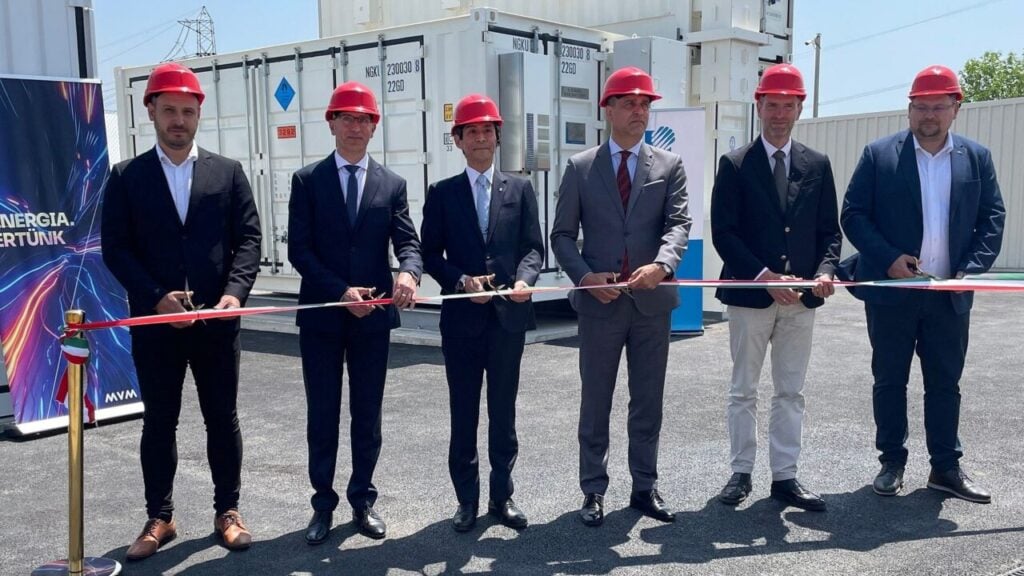
Japan’s NGK Insulators has discontinued its sodium-sulfur (NAS) battery product line, with the exit of its partner, BASF, thought to have led to the final decision.
NGK, a manufacturer of specialist industrial ceramics, first deployed the NAS battery in 2003, making it the longest-serving grid-connected large-scale energy storage technology in existence.
With more than 5GWh of total deployments worldwide, it is also thought to be the second-most-deployed battery energy storage system (BESS) technology, after lithium-ion (Li-ion). It is also the most-deployed medium- to long-duration energy storage (LDES) technology so far after pumped hydro energy storage (PHES).
On 31 October, the board of directors at NGK’s headquarters in Nagoya, western Japan, “resolved to discontinue the manufacturing and sales activities of NAS batteries (sodium-sulfur batteries) under its Energy Storage Business, and to cease accepting new orders.”
Try Premium for just $1
- Full premium access for the first month at only $1
- Converts to an annual rate after 30 days unless cancelled
- Cancel anytime during the trial period
Premium Benefits
- Expert industry analysis and interviews
- Digital access to PV Tech Power journal
- Exclusive event discounts
Or get the full Premium subscription right away
Or continue reading this article for free
The company will continue to service existing customer sites.
It generated JPY6.4 billion (US$41.97 million) in NAS battery sales in the financial year (FY) ending 31 March 2025, which was about 1% of its total sales from all activities of JPY6.2 billion for the financial year.
The NAS battery is designed to provide energy storage for applications that require a 6-hour-plus discharge duration, using sulfur anodes and sodium in the cathodes, with NGK’s proprietary ceramic electrolyte.
The battery operates at high temperatures, and the company claims it will suffer less than 1% degradation per year over a 20-year lifetime. It is also made with relatively abundant materials.
“It’s still a great technology that maybe was not in the right environment, in the right time,” Gauthier Dupont, director of strategy and partnerships for NGK’s energy storage business in Europe, told Energy-Storage.news.
Dupont said that despite this “wrong timing,” NGK management saw the NAS battery as “a technology that deserves attention, because it could still be a very, very excellent alternative to lithium-ion, especially in terms of environment and also in terms of cost.”
“Sodium, sulfur, steel, aluminium. It’s still economically and environmentally competitive from a materials point of view,” Dupont said.
BASF exited partnership to focus on core business
NGK entered its partnership with German chemicals company BASF in 2019. The pair aimed to bring the NAS battery into the big time by leveraging BASF’s distribution and sales channels, and crucially, by investing in a gigawatt-hour-scale production plant.
In September that year, at an industry event in the UK, Gauthier Dupont said that achieving manufacturing scale was essential to the commercialisation prospects of the tech. With all product made and shipped from a relatively small factory in Japan, a NAS gigafactory would “easily” reduce the cost by 50%, Dupont said.
Indeed, more recent project and deal announcements have shown NGK both consolidating its position in Japan and expanding its footprint internationally. Highlights included a 2023 announcement that a 70MWh NAS BESS would enter energy trading markets in Japan, an agreement by BASF with Malaysian manufacturer Leader Energy to deploy projects in Southeast Asia and the first projects to be completed or agreed in European countries, including Bulgaria and Germany.
Shortly before entering the BASF partnership, NGK had deployed its single biggest project to date, a 648MWh connected system distributed across multiple sites in the United Arab Emirates (UAE).
Most recently, the technology was selected for pilot deployment in the US by utility Duke Energy, as reported by Energy-Storage.news in May.
NGK had improved the NAS tech with recent iterations. The newest model, NAS MODEL L24, was launched by NGK and BASF Stationary Energy Storage last year, promising 20% lower cost than previous models.
However, its future prospects were heavily dependent on BASF’s investment. Although the chemicals company appeared to have gone all-in on the NAS battery, renaming its BASF New Business subsidiary to BASF Stationary Energy Storage, a change of leadership at BASF changed all of that.
Under new CEO Markus Kamieth, BASF reprioritised its core business segments, and in September, the company withdrew its support.
The BASF withdrawal was not unexpected after the German company began refocusing its efforts about a year ago. NGK conducted a search for alternative sources of financing, but it was ultimately fruitless.
One investor is understood to have come close to a decision before pulling out, perhaps due to a business environment in which upstream investments in a nascent battery technology were considered too risky compared to investment in downstream BESS projects.
It did not help that during the search, European lithium-ion battery gigafactory startup Northvolt went out of business, which was among the factors that may have added to investors’ trepidation.
“Looking into the future, a rebirth could be possible later on, but for the moment, it would be very difficult to foresee the right conditions for it,” Gauthier Dupont told Energy-Storage.news.
“The priority is to focus on continuing to provide mandatory services to our existing clients, and to take care of the people who worked for this product, some for more than 20 years, and to find them a new, interesting job in the company. That’s our most important short-term objective.”





